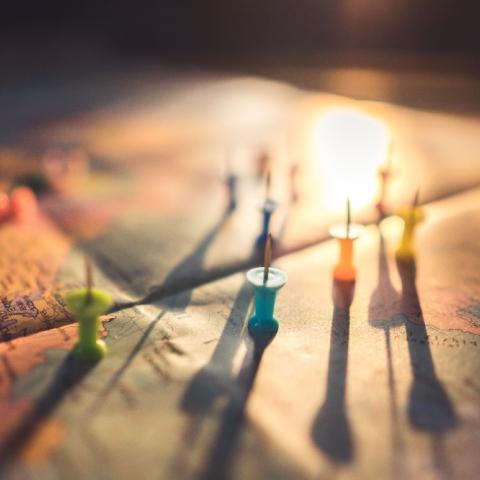Domestic Travel and Event Bans Event Professionals Need to Know About

Last updated March 14
The NBA has suspended its season and the NCAA Tournament will be played without fans. Live Nation and AEG are suspending all concert tours. Schools are closing. Organizations around the country are reacting to the news of COVID-19 by encouraging “social distancing,” and federal, state and local governments are imposing bans on travel and large gatherings — all in the name of halting the spread of the virus.
What this means for event professionals is that in many (and most likely, soon to be nearly all) locations, canceling or postponing an event is not a choice, but a requirement.
Here’s what you need to know now on a national and state level. Please note, this story continues to develop, and we are focusing on states which tend to hold a larger number of conventions and large events.
NATIONAL
On March 13, President Trump declared a national state of emergency, two days after issuing a ban on travel from Europe. U.S. citizens returning from the 26 countries in Europe’s Schengen area, however, will be permitted to return to the country. As of now, U.S. citizens can still travel to and from the U.K.
The CDC encourages all travelers to review this complete list of destinations and corresponding travel restrictions and warnings here before embarking on any international travel and is recommending travelers avoid all nonessential travel to the following European countries. The Department of State is also advising U.S. citizens to reconsider all travel abroad at this time.
- Austria
- Belgium
- Czech Republic
- Denmark
- Estonia
- Finland
- France
- Germany
- Greece
- Hungary
- Iceland
- Italy
- Latvia
- Liechtenstein
- Lithuania
- Luxembourg
- Malta
- Netherlands
- Norway
- Poland
- Portugal
- Slovakia
- Slovenia
- Spain
- Sweden
- Switzerland
- Monaco
- San Marino
- Vatican City
STATE
California: Governor Gavin Newsom issued an announcement on March 11 recommending banning gatherings of 250 or more people, and stated that a personal distance of at least 6 feet should apply to attendees at smaller meetings. Gatherings of individuals who are at higher risk for severe illness from COVID-19 should be limited to no more than 10 people, while also following social distancing guidelines. Many counties have now enacted bans of gatherings of more than 100 people.
Colorado: On March 10, Governor Jared Polis declared a state of emergency. In a news conference, Polis stated, “To our state and our economy, it’s important for me to say declaring a state of emergency does not mean that Colorado isn’t open for business, or recreation, or tourism. We are.”
Florida: Gov. Ron DeSantis issued a recommendation to local municipalities and private entities to strongly considering limiting or postponing mass gatherings during a March 12 news conference in Miami. However, no official ban has been put into place as of this news release.
Maryland: Gov. Larry Hogan announced a state of emergency after three confirmed cases of COVID-19 were confirmed in the state on March 7, according to the state’s Department of Health. All meetings of more than 250 people have been banned as of March 12.
Massachusetts: Gov. Charlie Baker declared a state of emergency as cases statewide jumped by 51 to 92 as of March 11. Of that number, 70 are now connected to a meeting held by the biotech company Biogen from Feb. 24-27 at the Marriott Long Wharf in Boston.
Nevada: On March 12, Gov. Steve Sisolak declared a state of emergency and indicated that he may call for a ban on large gatherings As of press time, no meeting bans or restrictions have been issued. However, many organizations have proactively canceled large meetings and events.
New Jersey: The number of coronavirus cases in the tri-state area has tripled since Friday (March 6) — surging from 49 cases to 156 — and leading Gov. Phil Murphy to declare a state of emergency.
New York: On March 12, Gov. Andrew Cuomo announced a ban on all gatherings of 500 or more people, while Mayor Bill De Blasio declared a state of emergency in New York City. All Broadway shows are shutting down for a month.
Ohio: Gov. Mike DeWine signed an order March 12 prohibiting gatherings of 100 or more people.
Oregon: On March 11, Governor Kate Brown announced a state-wide ban on meetings of 250 or more people. At this time, the ban is slated to last for four weeks.
Washington: Following his declaration of a state emergency on Feb. 29, Governor Jay Inslee issued a proclamation on March 11 restricting gatherings of 250 or more people in King, Pierce, and Snohomish counties. Washington has been home to the majority of deaths in the U.S. from COVID-19. In addition, Inslee is discouraging packing into crowded bars, saying such socializing has become “unacceptable.”
Washington D.C.: While no formal ban has been issued, the DC Health Department recommended on March 9 that all non-essential mass gatherings of 1,000 people or more be postponed or cancelled through March 31.
Visit our Event Industry Coronavirus Resources page for a list of industry resources and information on COVID-19.
Don't miss any event-related news: sign up for our weekly e-Newsletter HERE and engage with us on Twitter, Facebook and LinkedIn!


Add new comment